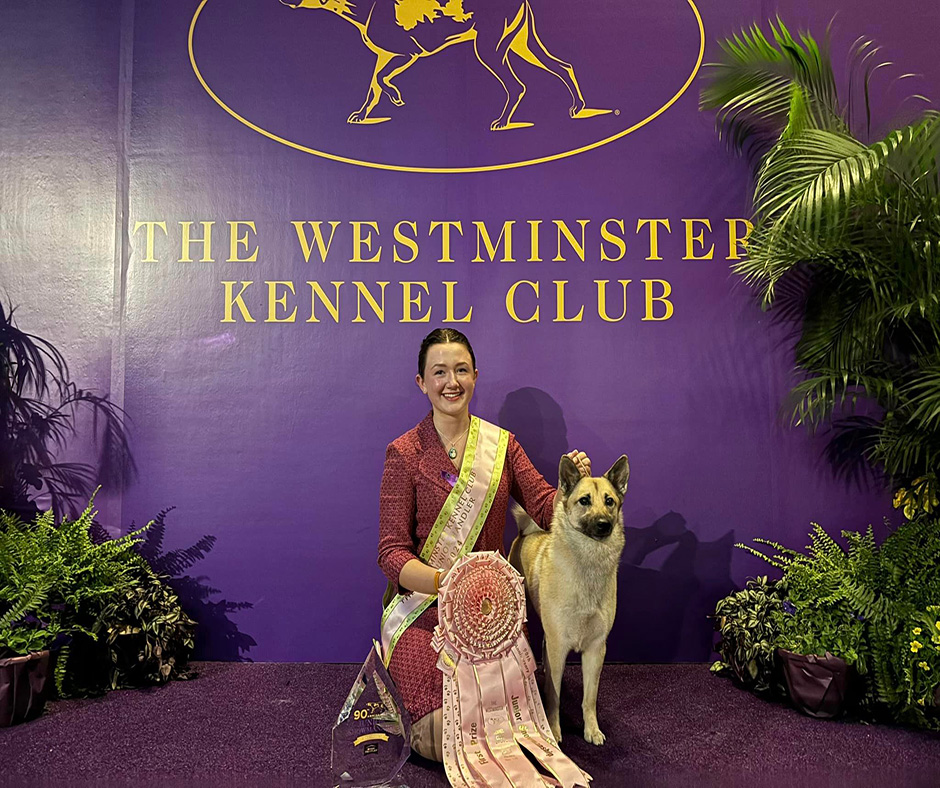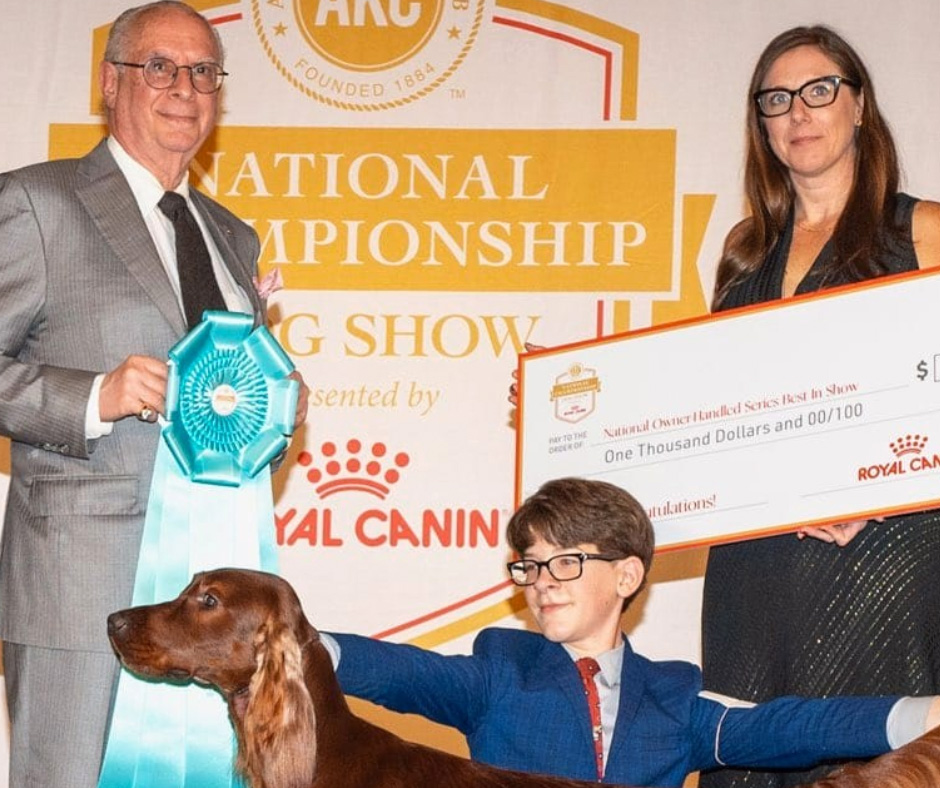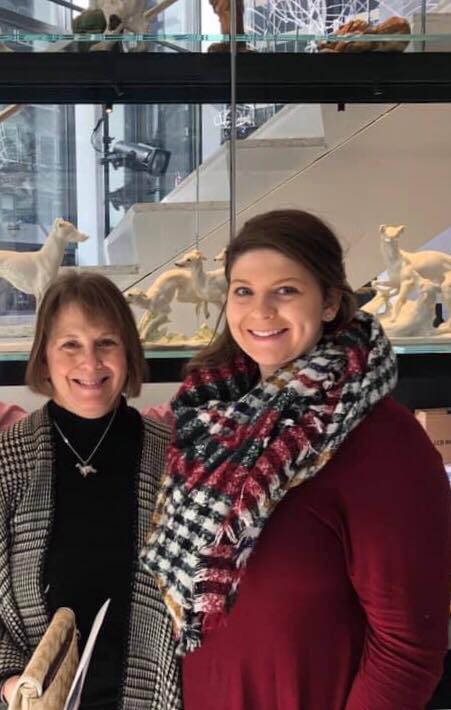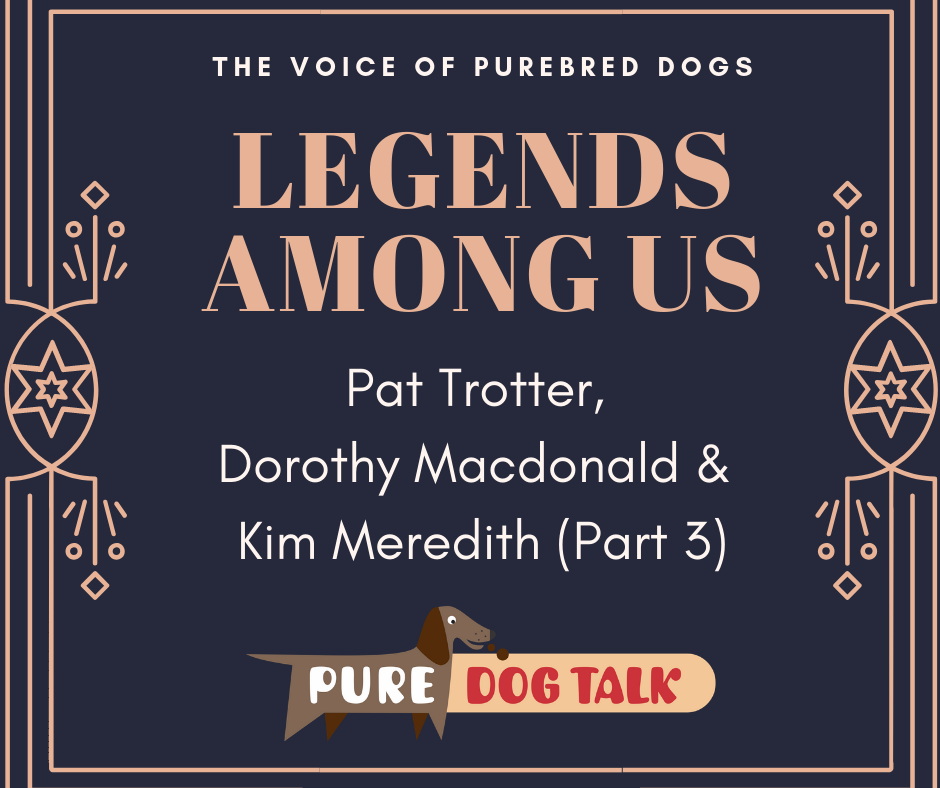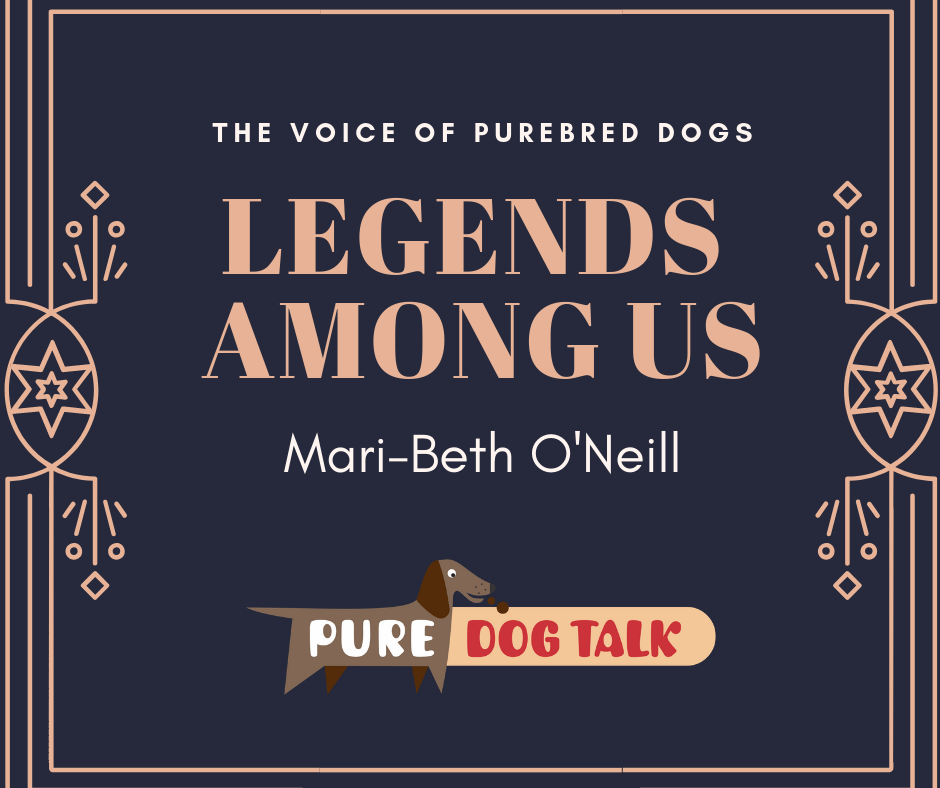712 – Junior Showmanship Regional Events Starting in 2026
Junior Showmanship Regional Events Starting in 2026
Host Laura Reeves is joined by Mari-Beth O’Neill, vice president of sports services at the American Kennel Club, to discuss the planned Junior Showmanship Regional events for 2026.
“I’ve always had that sort of dream that there would be something happening in each part of the country for the juniors,” O’Neill said. “And especially for the ones who may not be able to make it to Orlando, to the AKC National Championship or to Westminster. So, let’s do something that’s more local.”
Junior Criteria for Entry:
- The Junior must reside in the region
- The Junior will have earned three first place wins in an Open Class with competition in the prior 12 months ending 3 months prior to the date of the event
Requirements for a club to host a Regional Junior Showmanship Event:
- Use of a Superintendent
- Should there be an entry fee, it should not exceed the regular event fee
- The Junior Regional must be held in conjunction with an all-breed event
- AKC will offer $1,000 in Scholarship funds for Best Junior to be matched by the club
Clubs are encouraged to take part in this exciting opportunity to support the next generation of exhibitors by hosting a Regional Junior Showmanship Event in conjunction with their all-breed show in 2026. To be considered, please submit a Request for Consideration Form by December 5, 2025, to juniors@akc.org.
638 – Juniors’ Best Advice: Always Strive to Improve
Juniors’ Best Advice: Always Strive to Improve
Octavia Stensen, Best Junior at Westminster Kennel Club this year, joins host Laura Reeves for the behind the scenes story of how a non-dog show kid just capped off the triple crown of junior showmanship, having also won Best Junior at the AKC National Championship and made finals in Juniors at Crufts.
Stensen’s family acquired a Norwegian Buhund when she was 10 years old. Her first time in the ring left her in tears, but she persevered and nine years later she reached the pinnacle of the sport for juniors.
“We ended up getting Fiona and she became our new pet but the one catch of it was that we had to get her grand champion,” Stensen said. “I was like, ‘I’ll do it. I don’t even know what that means but I will do it. I don’t even know what this entails or what I’m doing in this, but I am going to do it.’ And so it started from there and it wasn’t easy by any means.
“I went to bed that night (after my first ring experience) thinking, I can do better and I can do better here and I could have done this and I’m gonna do that next time,” Stensen said. “And there was a next time, you know what I mean? There was like that idea of the future.
“I did eventually get her Grand and she is now our pet and we have since then bred her and got my heart dog out of that, Pineapple.

Octavia Stensen with her mom and Pineapple after the WKC Best Junior win.
“I am so, so lucky both my mom and my dad have been so supportive, but my mom really steps up. My dad is like, I’ll pay the bills, but my mom is like, I’m going to be here next to you and I’m going to travel with you to all of these things and I couldn’t be more grateful for that.
“They have definitely supported me in more ways than I could have ever, ever asked for. I mean, after winning at Orlando and walking out of the ring and then being like, so I guess I need to go to London now. And they were like, ‘okay, so let’s figure out how we’re going to finance that.’
Stensen’s advice to juniors coming up is always have fun and never stop improving.
“It is so, so hard to get caught up in the competition and freaking yourself out and getting all nervous but this is meant to be fun. It’s all for fun. We are coming to these things to have a good time, we’re not coming to these things to torture ourselves with nerves. Listen to your mentors and your peers and you can always be better. You can consistently improve. I mean, there’s never a moment in your life where you can stop getting better at things.”
613 – Junior Handler Wins NOHS Finals in Orlando
Junior Handler Wins NOHS Finals in Orlando
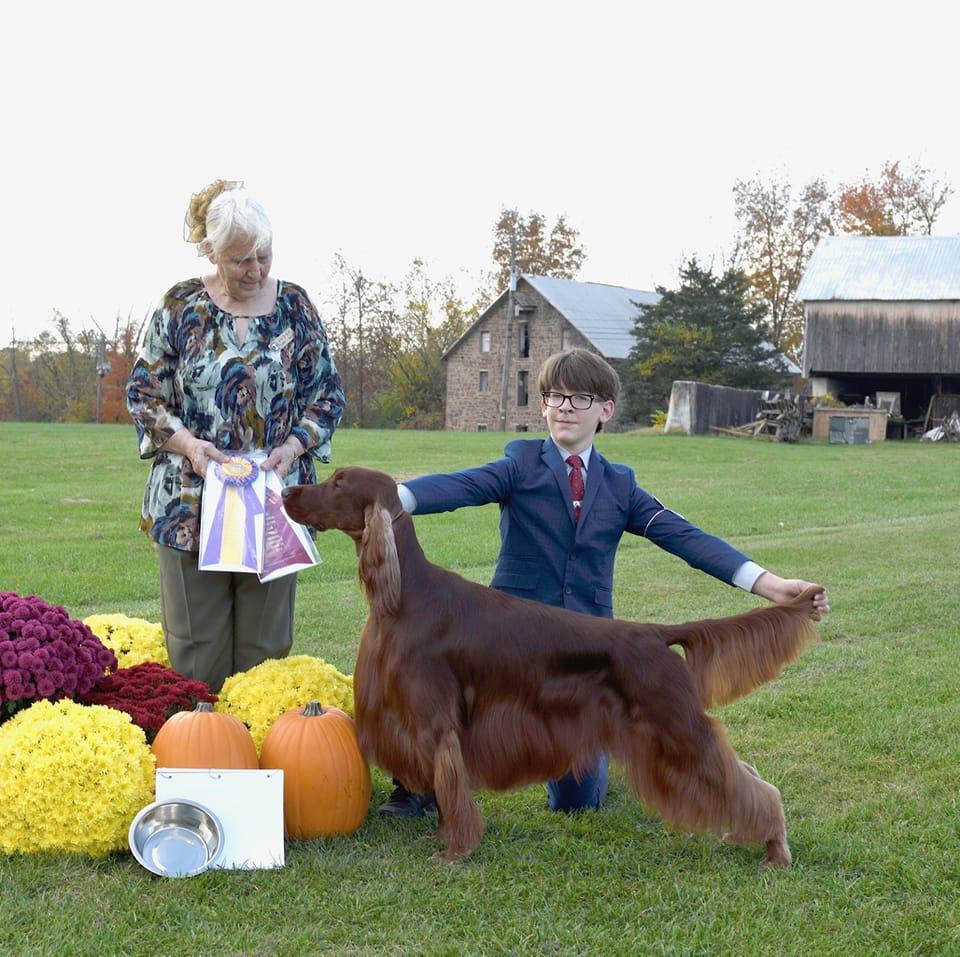
Adam showing his dog to Best of Breed.
The 2023 AKC National Owner Handled Series Finals was won by 14-year-old Adam Kucera and his two year old Irish Setter, Stryker. Adam and Stryker’s breeder, Patty Fanelli, join host Laura Reeves to share their story.
“At (Adam’s) first show, he beat me for Winner’s Dog,” Fanelli said. “It was one point with the brother. The next show was the Potomac Specialty. He went best in sweeps and he took a five point major and went best of Winners and best puppy.
“And I said to him, “You just took a five-point specialty major.” And he said, ‘I don’t even know what that is.’ He sure knows now.”
Stryker is Adam’s first Irish Setter that his grandmother arranged to purchase from Fanelli. He showed a Boston Terrier first, but really wanted to show a bigger dog.
Adam says he does all of Stryker’s grooming “except the clipper work because I am so afraid he’s going to just move and it’s just going to go, it’s all gone.”
The most challenging part of training Stryker, Adam said, was teaching him to freestack “Because he always just wants to jump, he always just wants to jump on my shoulders and thinks it’s time to play as soon as I hold a treat and not hold him.” A 4.0 home-schooled student, Adam says he practices with Stryker every morning before completing his school work.
Competing in NOHS gives Adam and is family more time to spend at the shows.
“My first show, we went to the show and I didn’t win the breed,” Adam said. “We went to go watch the groups and we saw that there were two groups going and we were like ‘why are there two, there should only be one?’ So then we found out what owner handler was. It’s kind of hard to show an Irish Setter. There’s not that many owner handlers out where I live, so if we want to stay a little bit longer at the show, we can do owner-handled and that gives us stuff to do and it’s a really fun competition.”
Adam has set lofty goals for himself and his dog. His remaining goals for Stryker include winning best of breed at the National Specialty and winning the breed at Westminster Kennel Club. He dreams of becoming a professional handler and breeding Irish Setters in his future.
Take a listen to the entire episode for more from this outstanding young man.
463 — 4H and All-American Dogs Competing in Juniors
462 – Talk ON! Juniors and Canine Partners
Talk ON! Juniors and Canine Partners
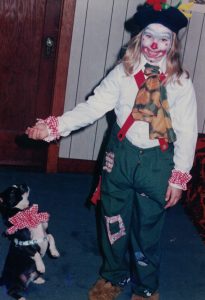 As part of Pure Dog Talk’s commitment to engaging conversations, modeling appropriate dialogue and encouraging thoughtful discussion, we are bringing you two sides of the currently white-hot topic in the dog world: AKC’s pilot program to allow junior handlers to exhibit Canine Partners in Junior Showmanship classes.
As part of Pure Dog Talk’s commitment to engaging conversations, modeling appropriate dialogue and encouraging thoughtful discussion, we are bringing you two sides of the currently white-hot topic in the dog world: AKC’s pilot program to allow junior handlers to exhibit Canine Partners in Junior Showmanship classes.
From Dog News:
At its January meeting, the American Kennel Club board of directors green-lighted a proposal from the Delegate Junior Sub-Committee and AKC staff to allow non-purebreds to be exhibited in Junior Showmanship.
The AKC pilot program is modeled after the rules used in 4-H, where mixed breeds are permitted. In order to compete, dogs must have an AKC Canine Partner number and meet the ownership eligibility criteria. Juniors will indicate the breed that the dog is being exhibited as on the entry form. So, for example, a dog entered as a Golden Retriever mix would be presented in the same way as a purebred Golden.
The rationale for allowing mixed breeds in Junior Showmanship is to provide an opportunity for a wider range of youngsters to participate in the sport of dogs, and give them an opportunity to learn, practice and improve their handling skills, as well as find mentors.
This pilot program will go into effect on July 1, 2021, and continue for 18 months before it is assessed in 2022. It is limited to all-breed shows or events holding all-breed Juniors.
Predictably, this topic has engendered heated discussion amongst the children and adults who populate this arena. Sadly, many of those conversations have devolved into the 21st century curse of ugly discourse.
As an antidote to this, we’re bringing you two weeks of conversation, devil’s advocate positions and insight from two perspectives in this debate. Listeners may or may not agree with one “side” or the other. But I firmly believe that until we *hear* one another, we can’t make progress … in anything.
Feel free to share your thoughts on the Pure Dog Talk FB page, or here in the comments. But rest assured, ANY ugliness, name calling or other inappropriate behavior will not be tolerated. Be passionate AND polite.
Today, Jody Davidson, long time Juniors coach and advocate, along with Bevin Towell, junior showmanship exhibitor, join host and moderator Laura Reeves to make the case for their position.
Next week we are joined by 4H leader and advocate Sarah Gardner for the “rebuttal.”
As always, talk ON!
419 – Juniors: Skills That Apply in High Powered Careers
Juniors: Skills That Apply in High Powered Careers
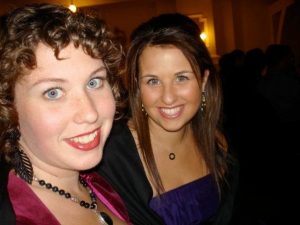 Carley and Cameron Simpson join Laura Reeves for a frank, inspiring conversation on how the skills they acquired as top tier junior handlers have influenced their high powered career paths 20 years later.
Carley and Cameron Simpson join Laura Reeves for a frank, inspiring conversation on how the skills they acquired as top tier junior handlers have influenced their high powered career paths 20 years later.
Work ethic, timeliness, handling disappointment, setting goals, confidence and the edge of determination carried them from rural Washington to the sets of Hollywood and the tracks of international bicycle competitions.
“So really the work ethic and the loyalty and determination and consistency, it all came from having these animals,” Cameron said, “and having to take care of them and knowing that they depend on you, there’s no option to not take care of them.
“It taught us our work ethic. To this day it’s very noticeable in my work environment that I definitely work a lot harder and I take my job very seriously. Anything I do, I put in 100%.”
“Currently I produce television,” Carley said. “I’m an executive producer, just finished up with a Netflix series. (T)imeliness is something I feel every day in my work. Literally we are starting on time and it’s thousands of dollars every minute we go over you know or 10s of thousands of dollars it can be. So the importance of being at a ring at 8:00 AM because you know that that judge is not gonna wait for you has directly translated into my job today.
“When I was in juniors I worked for a number of handlers and I remember I would put post-it notes on my mirror in my bedroom. One of those goals that I had written was to win the Garden. I worked my butt off every little step to try to get to that goal. That goal was always in the back of my mind for everything I did growing up and working with dogs. I didn’t win the Garden, but the fact that I made the finals, the fact that I got Third (in Juniors) it was a cherry on top. That to me was winning. When you learn to work at such a high level in a competition like dog sport, it directly translates then into your later life. You want to always achieve that high level of success again. You’re always working toward, ‘Can I get there. Can I get to that highest level.’”
The only woman in the room
“This (is a) career where it is very uncomfortable to be the only woman standing in the room,” Cameron said of her work in the high-end bicycle industry. “And it’s even more uncomfortable to be the only woman standing in the room who knows more than all of the men in the group and it only takes that little bit, just that break of ice, before everybody else in the room is like, ‘oh OK, yeah we see you as a human, you know we see you as a person, and as an advisor and as an employee, as a helper. All of that has been from dog shows. It’s been from just kind of having that (attitude) of ‘maybe I don’t belong here but I’m going to try anyways’ or I’m going to observe and adapt the situation to win.
“That was something that my mom always taught us. She had this quote, it lives with me every day, which is ‘Life is a game. Play it.’ And I think I took that to the Max. Especially with juniors. If there was a judge who was very eccentric and I could tell that you could win by doing A, B or C, I would do that. A judge who wanted you to look at her every 3 seconds, I did it. I tripped and fell and I won… so it was things like that. I would never show a dog like that, that’s not my style. But that was the game right then and that was the game to win.
“Carley and I are strong enough to realize that we have to love what we do in order for us to put the energy into what we do. We have to love it and so both of us really took that to heart early on. I can’t sit at an office and do this exercise. I have to go out and get a job that it’s gonna push me, that’s going to teach me, that’s ever changing, that’s growing, that has a ton of demand and that’s what we both did. I mean both of us hold very unique jobs in very competitive industries.”
Aim for the Top
“It doesn’t matter what the task is at hand,” Cameron said. “Do it better than anyone else around you. Then you won’t have to do it again and can achieve something better after that. No matter what you’re doing, if you’re going to show this dog study the ring, study the judge, study the game and play it. Don’t just go in half-ass and try to see what you can do. That’s never really gonna work.”
365 — Junior Showmanship from Competing to Judging
Junior Showmanship from Competing to Judging
Marti Day and Sarah Congleton are a mother-daughter junior showmanship judging juggernaut. Sarah and her brother Tanner started showing in juniors in 2005. Marti was the support person and chauffer. Mother and daughter both judged the huge junior showmanship competition at Orlando before the AKC National championship.
The family traveled to dog shows regularly, putting 250,000 miles on the family Suburban’s odometer. Sarah and Tanner competed in 4-H, juniors and regular breed competition, eventually working for handlers and breeders.
“We were so fortunate to work with top notch breeders,” Marti said. “We had people who offered us dogs and helped the kids learn how to groom. Parents should never do work for the juniors.”
Marti said she was rarely worried about her children traveling with breeders and handlers. The siblings generally were together, Marti said, adding “the Dog show world, in terms of children, really look after each other in an incredible way.”
As a parent, Marti expressed pride for her children’s success.
“The sport has made them outspoken, compassionate, understanding, motivated, organized young adults,” Marti said.
Sarah observed that junior entry numbers are decreased in recent years and throughout the purebred dog fancy “more has to be done than just saying juniors are the future of the sport.”
Mentorship along the lines of “Jody’s Juniors” and building a “dogmanship” program are some of Sarah’s emphasis.
“It’s not just running around the ring in a Saint John’s suit, we need to teach basic animal husbandry,” Sarah added.
Marti and Sarah both emphasized safety in judging junior showmanship, as well as “who would I trusty MY dog to.”
“I like to see the juniors and their dog relax. Everybody on edge isn’t good for either one. And, don’t be a prima donna. I want to see the rapport between you and your dog,” Marti said.
299 – Final Thoughts from the Legends: Juniors, New Judges
Final Thoughts from the Legends: Juniors, New Judges
The final installation from the Pure Dog Talk Friday Night Forum at Del Monte Kennel Club in 2017 with Pat Trotter, Dorothy Macdonald and Kim Meredith.
Judge following and “fly-ins”
Dorothy – won’t put dog down if they followed. If I liked him best, will go up every time. Don’t put up just because he’s there. Don’t keep track of it. Dog didn’t write the ticket.
Kim – if an exhibitor brings consistently the best dog, will put up.
Pat — Judge on the day. Only thing you’re thinking about. Who remembers where you were last week.
Juniors judging
Kim – very favorite thing to judge. Look for juniors to be like what I see in the ring. Not a lot of grandstanding. Smooth, confident. Don’t like it when they fake smile at me. Hands of gold.
Dorothy – I’m here for dogs. Decided not to judge them. I want the dogs. It’s the only thing I’m there for.
Pat – What I look for. Young person with a dance partner, in sync with each other. Right athletic ability for dog they’re showing. Judge on how they move a dog. If the breed calls for a loose lead, I want it to be shown appropriately for the breed. Want the child to be tuned in to dog. Move front from elbow, hind quarters from hock. Want in condition. No Dandruff, dirty teeth, ungroomed, fat. Show your dog, only look at judge enough to know what’s going on. Look at your dog. Dress appropriately. Age appropriate. Want to improve handling – go watch juniors.
Talking to dogs in the ring
Kim — Whatever it takes your dog to do its best
Dorothy – so long as it doesn’t disturb the other dog
Pat – like to see people talk to their dogs. Dogs hear well. Don’t have to talk loud. Believe in communicating with dogs. It’s a relationship.
Provisional judging & soliciting assignments
Kim – old school. Never solicit. For our cluster, I rarely get solicitation. Depends on how you approach. Face to face makes a difference. In this day and age, judges need permit assignments. If judges are willing to fly in and judge for 3-4 $/dog. What’s your reputation? Are you respected in your breed? Can you run on time?
Dorothy – in talking to other judges, never asked anyone myself, others asked for me. Help each other.
Pat – Bottom line, it’s not just what you do after you get the badge, what you did before that. There are people promoting themselves to do judging far beyond their experience. Entitled to use acquaintances and friends. Need to get past fear of rejection. People who aren’t prepared to judge breeds they’re judging are also allowed to solicit. Sad state for the sport.
Listen to parts 1 and 2 of this fabulous series here: 296 – Pat Trotter, Dorothy Macdonald and Kim Meredith Speak at Forum | Pure Dog Talk and here: 298 – Legends part 2: What NOT to do, Too Many Dog Shows | Pure Dog Talk … Listen to Pat Trotter on Norwegian Elkhounds and Breeding here: 25 – Pat Trotter: Vin-Melca Norwegian Elkhounds and Master Breeder … Listen to Kim Meredith on the development of Woofstock here: 47 – Yellow Submarine, Rock and Roll, Peace Out and Woofstock: Kim Meredith
258 — Mari-Beth O’Neill: AKC’s Own Guardian of the Galaxy
Mari-Beth O’Neill: “Guardian of the Galaxy”
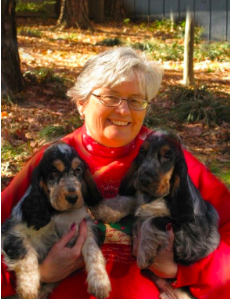 American Kennel Club Vice President of Sport Services, Mari-Beth O’Neill, is the walking, talking institutional memory of the organization. One of the longest serving current staff members, O’Neill is also a second-generation AKC employee. Her father was Executive Vice President of the organization and show chair of the AKC Centennial Show.
American Kennel Club Vice President of Sport Services, Mari-Beth O’Neill, is the walking, talking institutional memory of the organization. One of the longest serving current staff members, O’Neill is also a second-generation AKC employee. Her father was Executive Vice President of the organization and show chair of the AKC Centennial Show.
“I attended dog shows in utero,” O’Neill said. “My parents had Dobermans, but the rule was I had to have a dog I could pick up and carry out of a situation. That led to Manchester terriers.”
O’Neill owned and showed the top winning Toy Manchester Terrier of the time period, winning the toy group brace at the Garden in 1968 and the toy group in 1969 with Ch. Renreh Lorelei of Charmara.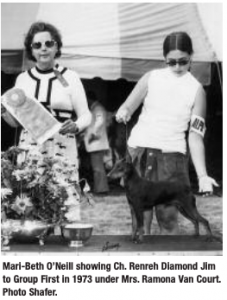
No Gypsy Caravan
Her parents insisted she couldn’t “just be a gypsy,” so she went to college and worked as a classroom teacher, along with working as an assistant for then-handler (Theresa) Terry Hundt.
“It was held over my head when I was growing up, if I didn’t maintain my grades, I didn’t play,” O’Neill said. That upbringing is what shapes the requirements of today’s Junior Showmanship contestants at AKC National Championship presented by Royal Canin.
In December, 160 juniors, the largest entry at the show, competed for Best Junior. All of them had won first place in an open class at least five times and maintained a 3.0 GPA during the year. The winner of the competition, Claire Ctibor, was interviewed on PureDogTalk last year.
Chipping Away at the Iceberg
Juniors have always been a passion for O’Neill. As she moved through the ranks and roles at AKC, she eventually wound up in a position to make a difference. In 1995 she helped establish the national junior organization for AKC. Since then she has continued to work to support the youth and future of the sport.
“Judging juniors is the hardest thing you will ever judge,” O’Neill said. “It’s a subjective sport. And it’s hard for new people to understand how subjective it is.”
An expanded coordination with 4H clubs, Junior showcase events, Junior scholarship programs and more are all the direct result of O’Neill’s passion for the program.
“I have this ice pick and there’s this big iceberg out there… I just keep chipping away at it…”
“We need to wake up and smell the coffee,” O’Neill said. “This ain’t my father’s AKC anymore. We have a lot more events, a whole different society to address. In many cases people love dogs but they’ve never been around them.”
“The greatest joy for me is meeting these young people, seeing how wonderful they are. What great careers they are pursuing, how they are maintaining their passion and involvement with dogs.
245 – Saturday Symposium: Words of Wisdom from Judges Panel
Saturday Symposium: Words of Wisdom from Judges Panel
Judges Stacey Davis, Fred Bassett, Darryl Vice and Doug McFarlane joined our panel at the Southern Oregon Kennel Club shows for a PureDogTalk Saturday Symposium discussion on mentoring the future.
Each of the judges shared their history in purebred dogs. From Davis who was born into the world of purebred dogs, to McFarlane who began his passion later in life, each laid out their own paths to help exhibitors understand they “weren’t hatched from an egg.”
Amongst the topics of discussion on the evening were match shows, 4-6 months puppy competition, junior showmanship and encouraging junior membership in kennel clubs.
Other important ideas included:
- Community outreach to public school students,
- encouraging exhibitors to consider performance and companion events
- dog shows that offer a fun atmosphere and variety of participation options
Join us for this great, moderated discussion, audience questions and encouragement for the future of the sport.


